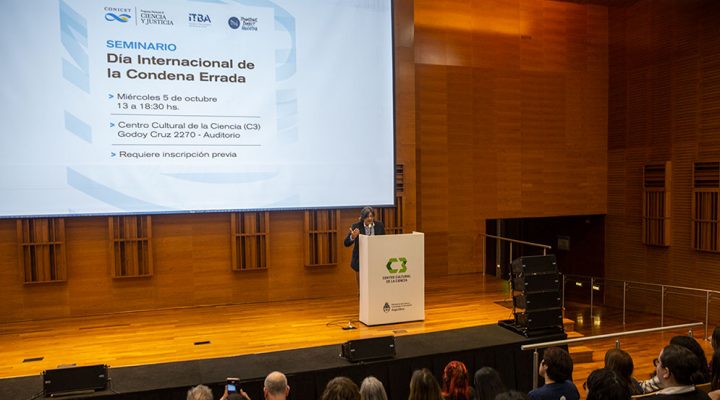NATIONAL PROGRAM FOR SCIENCE AND JUSTICE
Seminar on the International Day of Wrongful Conviction
It was organized by CONICET, the Technological Institute of Buenos Aires and the Fundación Proyecto Inocencia.
Within the framework of the International Day of Wrongful Conviction, a seminar organized by the National Scientific and Technical Research Council (CONICET) -through the National Program for Science and Justice (PNCyJ)- was held together with the ‘Instituto Tecnológico de Buenos Aires’ (ITBA) and the ‘Fundacion Proyecto Inocencia’ of Argentina.
The seminar was held at the ‘Science Cultural Center’ (C3) where experts on the subject, Justice agents, relatives of innocent victims of wrongful convictions, members of the academic community and the general public participated.
The manager of Legal Affairs of the Council and technical representative of the Program, Alan Temiño, highlighted the role of the PNCyJ as an articulator between the needs of Justice and investigation, mainly forensic. When describing the axes of the same, he stated that “the first link of the Program was with justice operators of the judicial powers and prosecutorial public ministries, mainly for assistance in complex judicial expertise that the test could not resolve and therefore required the contributions of science”. In this context, he recognized the Fundación Proyecto Inocencia as a justice operator whose work is enriched by scientific research.
The president and director of the Foundation, Manuel Garrido, stressed the importance of the meeting within the framework of the commemorative date that has been celebrated since 2012 every October 2 at the initiative of the member organizations of the Innocence Network in relation to the phenomenon observed around the world in which innocent people were condemned with their consequent personal and social effects. In this sense, he highlighted: “The Foundation arises from the premises: why are innocent people sentenced? And what can we do to prevent it? For this reason, the aim is to work for the innocent convicted by mistake and promote the necessary reforms to avoid them”.
The relevance of being able to work together justice and science lies in the fact that the former can provide cases as objects of scientific research and the latter, based on that, can analyze where the errors are and promote approaches that collaborate with the good management of justice. .
In this sense, during the meeting, a panel was developed made up of Rodolfo Guillermo Pregliasco, Cecilia Forcato and Andrea Sala who, from their training areas -Physics, Cs. Biological and Biochemical respectively – made contributions on how science evolves from the constant exercise of testing scientific advances, finding the interstices in which a technique could be applied, highlighting the importance of justice actors knowing advances and convene science whenever they have doubts about the evidence in order to prevent wrongful convictions and collaborate with confidence in the judicial system.
